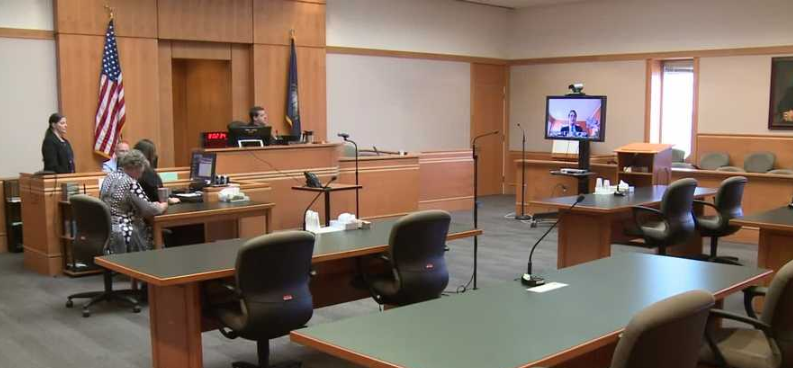By GARRY RAYNO, InDepthNH.org
CONCORD — Gov. Chris Sununu’s attorneys claim lawmakers who want a judge to reconsider his decision that they had no standing to sue the governor offer no proof the judge overlooked issues of fact or law.
In three fillings released late Monday afternoon, Solicitor General Daniel Will also objects to the lawmakers’ motions filed May 1 for an expedited ruling and to make a second amendment to their original complaint and asks the motions be dismissed.
Hillsborough County North Superior Court Judge David Anderson dismissed the original suit seeking an emergency injunction to prevent Sununu from spending money on the coronavirus epidemic without Joint Legislative Fiscal Committee approval, saying the Democratic legislative leaders lacked standing because no harm had been done.
The judge relied on 2014 state Supreme Court decision that said actual, not hypothetical, harm has to exist before the four lawmakers could proceed with the suit.
On May 1, Senate President Donna Soucy, House Speaker Stephen Shurtleff, Senate Finance Committee Chair Lou D’Allesandro and House Finance Committee Chair Mary Jane Wallner filed the reconsideration motion claiming Fiscal Committee members have been denied their constitutional and legal right to vote on accepting the federal money and on unappropriated expenditures.
“The Governor’s actions have deprived Fiscal Committee members their statutory right to vote on appropriations and nullified their votes, causing personalized injuries,” wrote the group’s attorney Gregory Silverman and Paul Twomey. “Plaintiffs Soucy and Shurtleff, as the lone constitutional officers of the legislative branch, may represent its institutional interests during this pandemic.”
In responding to the request, Will says the plaintiffs seek to adjust their legislative standing to the legal principles presented in the court’s earlier decision.
“The plaintiffs do not claim that this Court overlooked any points of law concerning legislative standing,” Will writes.
He further argues there is no complaint to amend because it has been dismissed and the lawmakers “seek reconsideration on the basis of factual allegations that have never been before this Court until now.”
And Will says lawmakers have the cart before the horse seeking an expedited ruling before the judge grants the reconsideration motion.
“Only in the event that this Court grants reconsideration would it make sense to consider a motion to amend,” Will writes. “Second, the proposed second amended complaint pleads facts that did not exist at the time this Court heard the motion for preliminary injunction.”
The second amendment refers to a Joint Legislative Fiscal Committee meeting that had not occurred when the court’s decision was issued.
That ruling stated the four legislative leaders did not have standing to bring the suit but did not rule on the legal issues raised by the two sides.
Even if the court decided to consider the new facts, Will argues, that does not change the legal standing of the lawmakers to bring the suit.
“The plaintiffs are masters of their complaint and at some point their pattern of amending in reaction to this Court’s explication of the legal requirements for their claims will impede this Court’s efforts to bring to expeditious conclusion litigation that distracts from the management of the COVID-19 pandemic,” Will writes. “This Court should not allow the plaintiffs to serially amend in continuing efforts to plead around this Court’s explication of applicable law in its orders.”
Along with the motion for reconsideration, the four Democratic lawmakers’ amended complaint added four new members of the Fiscal Committee to the suit, Sens. Cindy Rosenwald and Jay Kahn, and Reps. Peter Leishman and Susan Ford, all Democrats.
The reconsideration motion contends the eight lawmakers are state and federal taxpayers and under state law would be able to challenge what they consider illegal spending by the governor.
The lawmakers continue to claim under the constitution and state law that Sununu needs legislative approval through the Joint Legislative Fiscal Committee to spend unappropriated federal or state money to combat the spread of the coronavirus and to provide relief to businesses, organizations, people and governments impacted by the COVID-19 epidemic.
Sununu claims a 2002 law passed after the September 11 terrorist attacks gives governors expansive authority during emergencies including the flexibility to spend money where he or she sees fit to protect the public health and safety.
The state has received more than $1.25 billion in CARES Act funds to help offset costs associated with the pandemic, and Sununu has established the Governor’s Office for Emergency Relief and Recovery to oversee the distribution.
In a hearing before the court last month, Will argued the lawmakers had other remedies to address their concerns.
Anderson cited both state and federal court decisions with similar circumstances in siding with Will’s argument.
Garry Rayno may be reached at garry.rayno@yahoo.com





